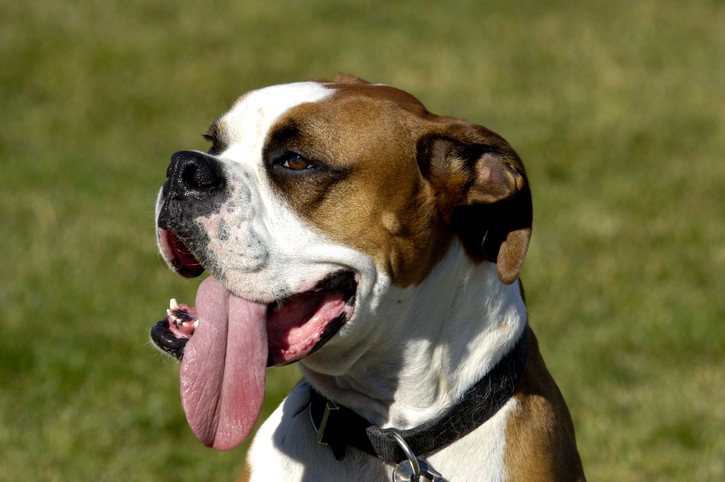
Why Do Dogs Pant?
As a dog parent, you’ve probably found yourself wondering why your dog pants. This is a relatively normal question for pet parents to have, especially if you’re a little inexperienced taking care of a dog! If you’ve asked yourself this question, you’re not alone, and it’s important to understand what panting means when caring for your canine companion.
With the help of the information outlined below, you should be able to get a better idea of what to expect if your dog is panting a lot. This information can help you figure out the underlying cause of your dog’s panting and can make it easier for you to recognize when there is a problem.
Mild Causes of Panting in Dogs
Being hot, excited, overexertion and your pet’s breed are mild causes for a dog’s panting.
Heat
Heat is one of the most common and least concerning causes of panting in dogs. If your dog is hot because the weather outside is warm, they may simply pant more often than they would otherwise. If the panting is not excessive and they have plenty of access to water and a cool place to rest, this is not a cause for concern.
Excitement
Dogs who are very excited may work themselves up so much that they begin panting. This is also relatively normal, and if your dog’s panting stops when they calm down again, it is nothing to worry about. Just be sure the excitement is truly caused by happiness and not by anxiety or fear.
Overexertion
If your dog overexerts during playtime or becomes extremely excited for a long period of time, they may pant as well. Once again, this is not a concerning cause of panting if they are able to calm down and return to breathing normally in a short time.
Breed
Some dog breeds are naturally more likely to pant than others. This is also within normal behavior for these dogs, but it is important to check with your veterinarian if you’re unsure whether your dog’s breed could affect their breathing.
Moderate Causes of Panting in Dogs
There are a few different things that could cause moderate panting in dogs including anxiety, fear, raspatory infection or pain.
Anxiety or Fear
Dogs who are very anxious or afraid may pant because of this anxiety. Although some fear and anxiety is not a cause for concern, you should pay close attention to whether or not your dog’s anxiety is a common problem. Some dogs may need to be put on anxiety medication to combat serious problems with anxiety.
Respiratory Infection
Respiratory infections may cause breathing difficulties in dogs. If this happens to your pet, they may pant excessively when trying to breathe. If they are being treated for the infection, this isn’t a major cause for concern; however, it is a sign that they likely need vet care to recover from the infection.
Pain
Pain may cause a dog to pant excessively. If you know or suspect your dog is in pain but you aren’t sure why, take them to the emergency vet right away to treat the underlying problem.
Severe Causes of Panting in Dogs
If your dog is panting from heatstroke, ingesting something toxic, a blocked airway or heart disease it is important to get to the vet right away.
Heatstroke
Heatstroke is a serious and life-threatening condition that occurs when a dog is overheated for too long. Excessive panting, excessive drooling, and difficulty breathing are some of the earliest signs of this condition. Take your dog to the emergency vet if you know or suspect they are suffering from heatstroke.
Toxicity
Toxicity or poisoning may cause excessive panting in some dogs. If you think your dog could have consumed a toxic substance, take them to the emergency vet right away for treatment. The sooner you take your dog in, the more likely it will be that they can recover fully from poisoning.
Blocked Airway
A blocked airway, even if the airway is only partially blocked, may contribute to excessive panting behavior in dogs. If you think your dog has inhaled or ingested something that is blocking their airway, go to the emergency vet right away to have the item removed.
Heart Disease
Heart disease may cause dogs to pant excessively as well. Although undiagnosed heart disease should be seen by a vet or emergency vet as soon as possible, diagnosed heart disease may not always require an immediate trip to the vet.
There are Many Reasons Why a Dog Would Pant
As you can see, panting isn’t always a major problem in dogs. However, it does typically mean something isn’t quite right, unless your dog is the type to pant almost all the time.
If your dog is panting excessively, pay close attention to any other symptoms to figure out what’s happening. If they seem to be having any trouble breathing or other concerning symptoms, don’t wait—take your dog to the emergency vet right away for proper diagnosis and treatment of the underlying health problem.
Do you have a question about your dog’s wellness and care? Book an appointment online at Boston Veterinary Clinic today!